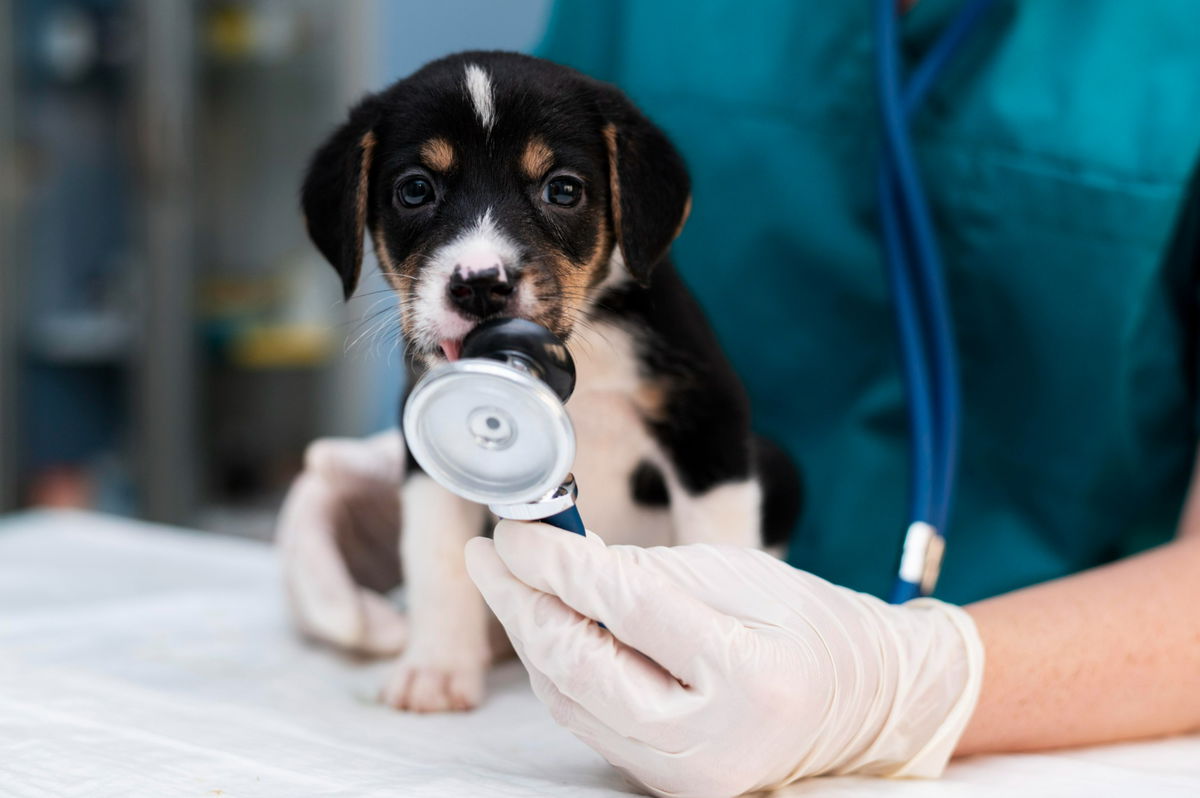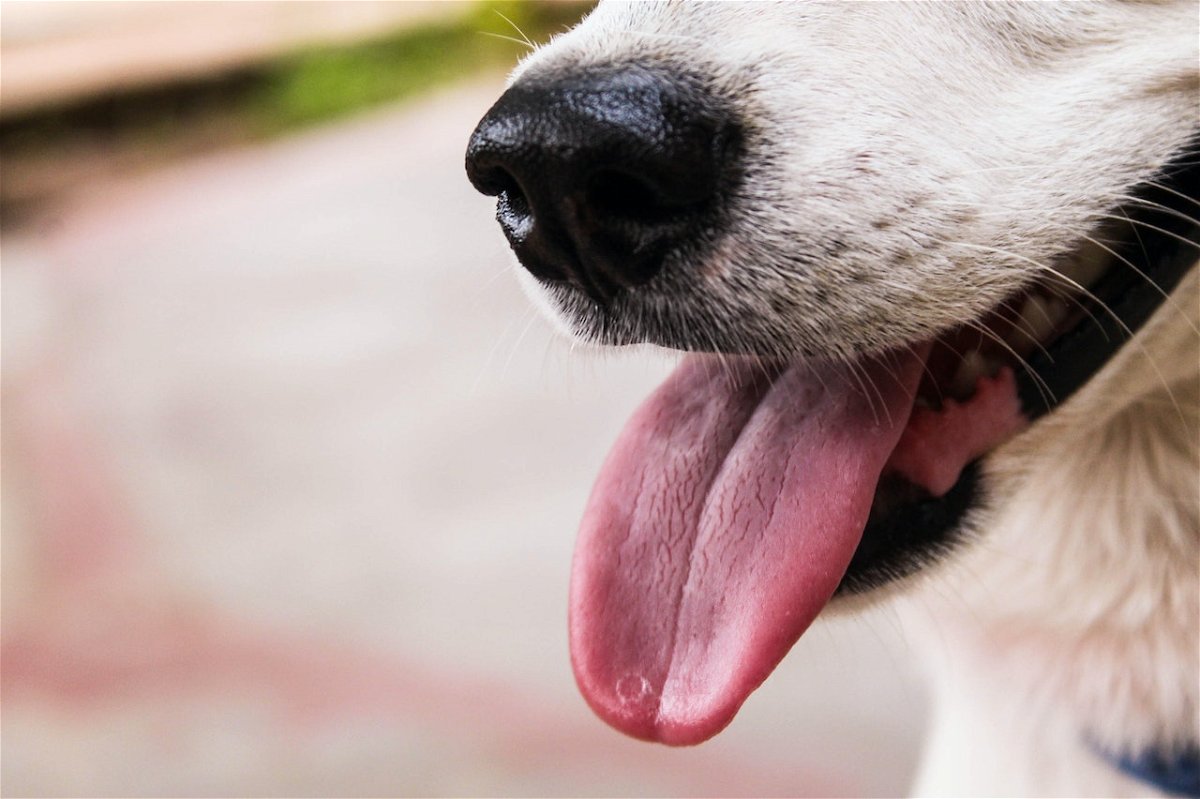We're an affiliate
We hope you love the products we recommend! Just so you know, we may collect a share of sales or other compensation from the links on this page at no additional cost to you. Thank you if you use our links, we really appreciate it!
You’re having a blast with your new puppy in your backyard. But all of a sudden you notice that your puppy is breathing so fast, that it starts to worry you.
If you’re new to puppy ownership, you may have a few questions about what normal breathing behavior is. The good news is that we have the answers and we’re going to share them.
You’ll learn various causes of rapid breathing. When it is normal for your puppy to breathe rapidly, and when you may need to seek an expert’s help.
Let’s start with normal breathing patterns for a puppy as our baseline for this topic.
What is Normal Breathing in Puppies?
The normal breathing rate for a puppy is between 15-40 breaths per minute. The wide range accounts for different rates in different breeds.
So, it’s a good idea to count your puppy’s breaths when you first get them to determine what is normal for your puppy.
Another thing that will affect your puppy’s breathing rate is its activity level. This means they are likely to breathe slower while they sleep and faster when they are active.
You may even notice your puppy panting if they are exercising hard. Panting is your puppy’s way of cooling down. So as long as it occurs during or after exercising it is not usually a cause for concern.
Along with exercise, excitement is another reason your puppy may breathe faster. Your puppy may be excited about treats, food, other dogs, people, or anything else that is new to them. Fast breathing when these occur is perfectly normal.
Let’s dive a bit deeper into common causes of rapid breathing.
Why is My Puppy Breathing So Fast? Common Causes
Just like humans, puppies can experience rapid breathing for many reasons. But when do you need to call a vet and when do you just need to let your puppy cool down? Let’s dig into this very important topic.
Physical Activity and Playfulness
When puppies play, they typically move at a high rate of speed. Because they are exercising, their heart rate goes up, and their breathing increases.
Think about when you had to take gym class in grade school – your heart rate went up and your breathing increased. This is what your puppy is going through while they play.
As puppies run around fetching balls and chasing other puppies, they expend a lot of energy. As a result, they need to get more oxygen to their muscles quickly. This causes them to breathe faster.
A side effect of this can lead to panting.

Heat and Overheating
Panting is breathing hard with the tongue out and the mouth open. Seeing your puppy pant is not a cause for alarm initially.
It does mean that you should slow down on playing with them for a bit. Panting is how puppies and dogs cool themselves off after exercising.
If your puppy is panting and throwing up water, you have a different problem. Your puppy is overheating.
You need to take them to a cooler (but not cold) place without a draft. Let them cool down for a while and then offer them small amounts of lukewarm water. Once they have cooled down even more you can give them more water.
Puppies can’t control their body temperature as well as dogs can. So, this is something you need to be aware of.
If your puppy’s increased breathing rate is not due to overheating, there may be another cause.
Stress and Anxiety
Puppies are experiencing all sorts of new things as they grow up. This can lead to some discomfort for them.
Some puppies get stressed or anxious when they are introduced to new experiences. When a puppy gets anxious its heart rate increases. This also will increase its breathing rate.
Situations like:
- New environments
- Other animals
- New people
- Loud noises
- Being left alone for the first time
All of these can create stress for your puppy and cause them to breathe faster. The more you socialize with them and encourage them to be confident, the better off they will be.
If your puppy is breathing rapidly because of stress, it may not be the only underlying cause. It is important to be able to tell when pain is causing your puppy to be stressed.
Pain or Discomfort
If your puppy is in pain, it can cause increased breathing rates. Pain and discomfort can in turn cause stress. There are lots of different pain symptoms to look for to diagnose this as the reason for rapid breathing.
Symptoms of pain:
- Lack of appetite
- Holding their body and head close to the ground
- Obvious signs of limping or stiffness when getting up
- Grumpiness and flattening ears
- Shaking, trembling, or panting
- Low Energy levels, refusing to play or exercise
If you see any of these signs alongside panting or rapid breathing, it’s likely time to call the vet.
If you aren’t seeing these signs it could be something else entirely.
Respiratory Infections
So, you’ve ruled out normal causes, overheating, stress, and pain. What is the next possibility? Your puppy could have a respiratory infection.
If your puppy has been around unvaccinated animals, they may have caught a respiratory infection from one of them. Remember to vaccinate your puppies before taking them outside.
Keep an eye out for coughing, labored breathing, or noisy breathing. These can be major signs of a respiratory infection. Sometimes these can be long-term and getting your puppy help from a vet is very important.
The next step in diagnosing your puppy’s breathing issues is to check their heart.
Heart Problems
Rapid breathing can sometimes be caused by congestive heart failure. In this instance, fluid is building up around your puppy’s lungs and causing it to be hard for them to breathe. Check for blue gums, lethargy, coughing, and panting.
This is very serious and could result in medications or surgery. So, if you see these signs contact your vet immediately.
On a less stressful note, it may not be heart problems and could just be allergies!
Allergies and Respiratory Irritants
Allergies cause fast breathing because the airways in your puppy are constricted. If your puppy is in a new environment and starts to breathe rapidly, this may be a factor to check into.
Some common allergies that your puppy could be reacting to are pollen or dust mites. They may have itchy and watery eyes, coughing, sneezing, or fast breathing. These can occur year-round or seasonally and it’s a good idea to get your puppy checked out by a vet.
Another new environment that could be causing rapid breathing is high altitude.
High Altitude
The higher you climb above sea level, the less oxygen there is in the air. This is why some people experience altitude sickness when they travel to places at higher elevations. Their bodies have to work harder to get the oxygen they need. The same thing can happen to your puppy.
Some signs to look out for:
- Shortness of breath
- Elevated heart rate
- Not eating
- Vomiting
- Pale gums
- Lethargy or clumsiness
- Swelling
- Fever or bloody nose
To combat altitude sickness, you should limit their exercise, offer lots of water for them to drink, and slowly move down to a lower elevation. A good way to increase their moisture intake is to offer wet foods rather than dry ones.
But you haven’t gone to high altitude, so what could be another normal possibility? Is your dog overweight?
Obesity
Possibly one of the easiest causes to diagnose. If your puppy is extremely overweight, it can affect their ability to breathe.
If your puppy is overweight, they often have to work twice as hard to move as their fit companions. Obesity puts a lot of pressure on the heart and lungs. Based on recent studies it may even decrease lung elasticity.
Making sure your puppy is the perfect weight is important to their health as well as their breathing. But what are some less common causes of rapid breathing in puppies?
What is My Puppy Breathing So Fast? Less Common Causes
Not all causes of rapid breathing are very common. There are four causes that you may not run into, but it’s still important to be aware of them.
Excitement and Anticipation
If your puppy is excited about their surroundings or anticipating treats, it might cause rapid breathing. It is likely that they are moving a lot and their heart rate is up. If something new is going on around them, you may notice rapid breathing.
You shouldn’t let this concern you. But if they calm down and their breathing doesn’t slow, you may have a bigger problem.
A more critical breathing issue may be caused by a health issue.
Fever and Infections
Fevers and infections can often cause your puppy to breathe rapidly. Especially when the infection travels to the lungs and causes pneumonia. If your puppy winds up with a fever, infection, or pneumonia, they will need antibiotics to treat it.
Their bodies are working very hard to fight the infection. Resulting in fast breathing. It is important for you to work with a vet to help them.
There are a couple of other scary causes of rapid breathing in puppies.

Toxicity and Poisoning
This is a big one. If your puppy is breathing fast, vomiting, drooling, or acting strange in any way. Puppies are curious and love exploring with their mouths. Even lots of common items we keep in our house are toxic to animals.
You must consult poison control if you think your puppy got into something they shouldn’t have.
Another bad cause is heartworm.
Heartworm Disease
Heartworms are worms that live in a dog’s heart. They make it harder for the heart to function. There is no way to cure a dog of heartworms. So, it is important to work as hard as you can to prevent them in the first place.
If you notice your puppy rapidly breathing, coughing, decreased appetite, not wanting to exercise, or losing weight, it’s time to check them for heartworms. If left untreated, the worms will reproduce and can reach unmanageable levels. The faster the diagnosis occurs, the better life your puppy will have.
So, your puppy is short of breath, but when should you get professional help?
When to Seek Veterinary Attention
Some causes of rapid breathing may be harmless. But some are a lot more concerning. Let’s go over the signs that it may be time to look for specialized help.
Symptoms that should send you to the vet:
- Shortness of breath or panting
- Vomiting
- Lack of appetite
- Lethargy
- Not wanting to play
- Weight gain or loss
- Pale or blue gums
- Fever
- Any of the signs of pain
If your puppy is exhibiting 2-3 of these symptoms, it’s time to get help. You don’t want to put your puppy’s health at risk if there’s a possibility they need help. Sometimes the faster you seek help the better chance your puppy has at a healthy life.

Frequently Asked Questions
How do I differentiate normal panting from concerning rapid breathing in my puppy?
Normal panting occurs after your puppy has exercised or if your puppy is overheated. If your puppy is breathing rapidly and has other symptoms, there may be cause for concern.
What can I do to help my puppy if they are breathing rapidly due to heat or exercise?
First, you want to bring your puppy to a cooler place and keep them calm. Once they have cooled down a little bit you can start giving your puppy water.
My puppy is breathing fast and seems distressed. What should I do before I can reach a veterinarian?
If you can’t get to the vet immediately move your dog to a cool area and start pouring cool water over them.
You can place wet towels underneath them and give them small amounts of lukewarm water to drink. Avoid pouring water near their head and don’t put damp towels on top of them as this will trap the heat.
Why is my puppy breathing so fast while sleeping?
Puppies dream a lot while they sleep. Which can cause them to breathe faster. Fast breathing is not necessarily a cause for concern on its own.
Unless there are other signs and symptoms as well. If the fast breathing continues, then you might need to call a vet.
In Conclusion
There could be many different causes of why a puppy is breathing fast. It is important to know your puppy’s normal rate to make a comparison.
If your puppy’s breathing rate increases and they exhibit other signs and symptoms, it may be time to call the vet.
Calling the vet before the symptoms get worse can often make treatment easier. It will also make your puppy and you happier in the long run.
Laura is the founder of Furs'n'Paws. She is a also a pet writer and expert with more than 20 years of experience of working with dogs and cats. She developed a very strong love for animals at a young age. Her passion led her to establish a thriving pet sitting and dog walking business in Dubai. As an expert in pet training, behavior, and nutrition, Laura is committed to helping pet owners and pet lovers by offering high-quality information on a wide range of topics.



No responses yet